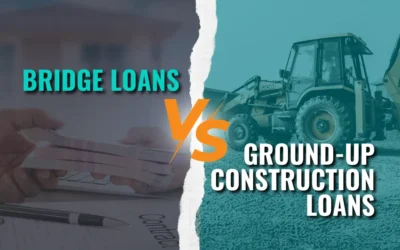In the dynamic world of real estate, the term “ground-up” often surfaces, carrying with it a vision of creativity, potential, and architectural freedom. But what does ground-up mean in the context of real estate, and why does it matter to investors, developers, and future property owners alike? This comprehensive exploration will peel back the layers of ground-up projects, revealing their significance, challenges, and rewards.
Understanding Ground-Up Construction
Ground-Up Construction Defined
At its core, ground-up construction refers to the process of starting a building project from an undeveloped parcel of land. This means that the project begins with nothing but raw land, presenting a blank canvas upon which developers can design and build according to their vision and the needs of the intended occupants.
Why Choose Ground-Up?
Ground-up construction is not just about building structures; it’s about realizing visions and catering to specific market demands. This approach allows for the creation of customized spaces that are optimized for their future use, whether for residential, commercial, or mixed purposes.
The Phases of Ground-Up Development
Initial Planning and Zoning Considerations
Every ground-up project starts with meticulous planning, including market research, feasibility studies, and navigating the complexities of zoning laws and regulations. This phase lays the groundwork for what is possible on the site.
Design and Permits
Following planning, the design phase translates vision into blueprints. This stage requires collaboration between architects, engineers, and city planners to ensure the project meets all legal and safety standards. Obtaining the necessary permits is a critical step before construction can begin.
Construction and Completion
The construction phase is where ground-up projects come to life, from laying foundations to framing, wiring, plumbing, and finally, finishing work. This phase demands significant coordination to keep the project on schedule and within budget.
Benefits and Challenges of Ground-Up Projects
Customization and Efficiency
Ground-up construction offers unparalleled customization, allowing for efficient use of space and incorporation of modern technologies and sustainable building practices from the start.
Risk and Reward
While ground-up projects can yield significant returns on investment by fulfilling niche market needs or creating iconic landmarks, they also come with higher risks. Delays, unforeseen costs, and market shifts can impact project viability.
Financing Ground-Up Construction
Ground-up projects require substantial financial resources. Construction loans, such as those detailed by Equity Lending Solutions, play a pivotal role in bridging the gap between project inception and completion. These loans are tailored to meet the unique needs of ground-up developments, offering the flexibility and support necessary to bring ambitious projects to fruition.
Case Studies: Ground-Up Success Stories
Exploring real-life examples of ground-up construction can provide valuable insights into the process and potential of starting from scratch. These stories highlight the innovative solutions and strategic planning essential to the success of ground-up developments.
Ground-Up Construction: A Future-Proof Approach?
As the real estate market continues to evolve, ground-up construction remains a compelling approach for creating spaces that meet the future needs of communities and industries. By starting from scratch, developers have the opportunity to innovate and adapt to changing trends and technologies, potentially setting new standards in design, efficiency, and sustainability.
Navigating the Ground-Up Journey: Tips for Success
Embarking on a ground-up project requires a comprehensive understanding of the process, from initial planning to final completion. Here are tips and strategies for navigating the complexities of ground-up construction, ensuring a smooth journey from concept to reality.
The Role of Technology in Ground-Up Construction
Advancements in technology are transforming the ground-up construction process, from virtual reality in design to automation and robotics in construction. Exploring how these technologies are being integrated can provide a glimpse into the future of real estate development.
Building from the Ground Up
Ground-up construction in real estate represents an opportunity to craft spaces uniquely tailored to their intended use, location, and community. While the path to completing a ground-up project is fraught with challenges, the potential rewards — both financial and in terms of impact on the built environment — are significant. As the industry continues to evolve, the principles of ground-up construction will likely play a critical role in shaping the future of real estate development.
Understanding the nuances of ground-up real estate projects, from conception through construction to completion, reveals the immense potential and complexity of building from scratch. By embracing innovation, navigating challenges with strategic planning, and leveraging the latest technologies, ground-up construction continues to offer a pathway to creating distinctive, efficient, and forward-thinking properties.
FAQs
What makes ground-up construction different from other types of real estate development?
Ground-up construction differs from other types of real estate development by starting from undeveloped land, allowing for complete customization and innovation from the outset. This approach provides a blank canvas for developers, offering the flexibility to design and construct buildings specifically tailored to their vision and the needs of future occupants, unlike redevelopment projects that must work within existing structures.
How does the financing of ground-up construction projects typically work?
Financing for ground-up construction projects typically involves construction loans, which are short-term loans designed to fund the construction phase. These loans cover everything from initial planning and permits to the construction costs themselves. Once the project is completed, the loan is either paid off or converted into a traditional mortgage. Financing options like those from Equity Lending Solutions are crucial for bridging the financial gap from project inception to completion.
What are the biggest challenges faced during ground-up construction projects?
The biggest challenges in ground-up construction include navigating zoning laws, managing construction costs, and adhering to project timelines. Zoning laws can restrict the types of buildings allowed on a site, affecting the project scope. Cost overruns and delays are common, stemming from unforeseen issues during construction, making risk management and contingency planning essential.
Can ground-up construction be more sustainable than other development methods?
Ground-up construction can be more sustainable than other methods, as it allows for the incorporation of green building practices and technologies from the beginning. This approach enables developers to integrate energy-efficient systems, sustainable materials, and environmentally friendly designs, potentially reducing the building’s carbon footprint and operating costs over its lifespan.
How do zoning laws impact ground-up construction projects?
Zoning laws significantly impact ground-up construction by determining what can be built on a site. These laws dictate the type of buildings allowed, their height, density, and usage, ensuring that new constructions align with the community’s planning objectives. Navigating these regulations is a critical first step in the development process.
What role does technology play in modern ground-up construction projects?
Technology plays a pivotal role in modern ground-up construction, enhancing efficiency, accuracy, and safety. From drones for surveying and 3D modeling software for design to virtual reality for visualizing spaces and automated machinery for construction, technology streamlines the construction process. These advancements allow for more precise planning, reduce errors, and can even shorten project timelines.




